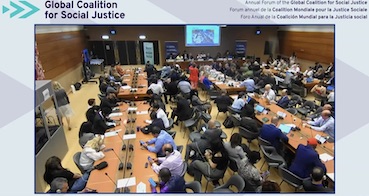On 12 June 2025, the ILO-led Global Coalition for Social Justice held its annual forum in the margins of the 113th Session of the International Labour Conference (ILC). One of the key topics addressed at this year’s Forum was the Human Rights Economy (HRE). A high-level partners’ conversation explored how the HRE can provide a framework and operational approach to embed human rights into economic and social policymaking.
The discussion brought together high-level government officials and representatives from UN agencies, employers’ and workers’ organizations and civil society. The social and solidarity economy (SSE) was highlighted as a critical lever for making the human rights economy a reality.
Georges Mischo, Minister of Labour of Luxembourg, emphasized the role of stakeholders in the social economy in promoting social justice, environmental responsibility and sustainability. He noted that social economy enterprises contribute to social justice by creating job opportunities for those most excluded from the labour market, and by providing affordable solutions in areas such as education, housing and health. They also address inequalities and combat all forms of discrimination while adopting sustainable practices that preserve resources for future generations. “In a world facing increasing inequality, it is imperative to create a conducive environment for the social economy and social innovation,” he said.
Adriana Martins, Head of the Social Issues Division at Brazil’s Ministry of Foreign Affairs, shared insights from Brazil’s G20 presidency, which prioritized inclusive growth and the realization of social rights, alongside efforts to combat poverty and hunger. She underlined the need for ambitious sustainability policies and highlighted the solidarity economy as a key response to the challenges posed by the growth of unemployment and informality.
Magdalena Sepúlveda, Director of the United Nations Research Institute for Social Development (UNRISD), pointed to the advancement of alternative economic models, such as the SSE, which challenge the dominant extractive growth paradigm by fostering collective well-being, ecological sustainability and social justice.
Santosh Kumar, Director of Legislation at the International Cooperative Alliance (ICA), reaffirmed the longstanding partnership between the ICA and the ILO, dating back to 1919. Speaking on behalf of SSE partners, he referred to the recent report by the UN Special Rapporteur on Extreme Poverty and Human Rights, ‘Eradicating Poverty Beyond Growth’, which calls for a shift away from profit-driven models that result in inequality and exclusion, and towards a human rights economy within planetary boundaries. The report identifies the SSE as a first priority in this transition.
He welcomed the ILC Resolution concerning the Second World Summit for Social Development, 2025, which commits to promoting an enabling environment for SSE entities. Toni Moore, General Secretary of the Barbados Workers’ Union and workers’ representative for the International Trade Union Confederation (ITUC) at the session urged the upcoming World Summit for Social Development to deliver an ambitious outcome that could strengthen multilateral action and help make the human rights economy a reality. She emphasized the importance of social dialogue and social partnership to translate HRE principles into practice.
In her closing remarks Moore commended the partners’ emphasis on the SSE as a critical lever for achieving the HRE. Referring to the work of the ILO’s COOP/SSE Unit, she highlighted the importance of the SSE as a cross-cutting issue.
Watch the recording of the event: Partners conversation – Human rights economy







